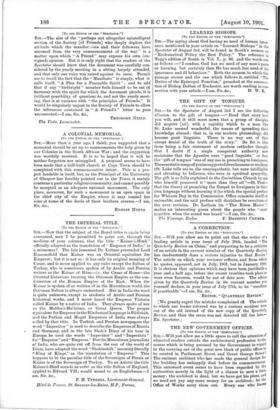THE GIFT OF TONGUES.
[TO THE EDITOR OP THE "SPECTATOR:?
SIR,—In the Spectator of August 3rd I see the following allusion to the gift of tongues :—" Read that story how you will, and it still must Mean that a group of disciples did acquire [sic], with a rapidity which to a man like St. Luke seemed wonderful, the means of spreading their knowledge abroad; that is, in our modern phraseology, did become good linguists. There is no way out of that except denial of the truth of the story." So far is this from being a fair statement of modern orthodox thought that I doubt if a single competent authority now maintains that the Apostles were "good linguists," or that the " gift of tongues" was of any use in preaching to foreigners. These ecstatic songs of praise suggested drunkenness or madness (St. Luke tells us) to the unsympathetic, but were intelligible and elevating to believers, who were in spiritual sympathy. The gift is so fully explained to the Corinthian Church by one who himself possessed it " more than they all"—St. Paul— that the theoiy of preaching the Gospel to foreigners in their own language without learning it (to which the special preface for Whitsun Day in the Communion Office commits itself) is untenable, and the said preface will doubtless be rewritten at the next revision. Dr. Latham (in " The Risen Master") makes' an interesting guess about the people who "came together, when the sound was heard."—I am, Sir, &c.,


































 Previous page
Previous page